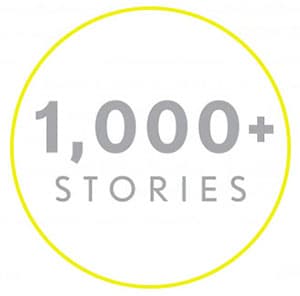This story is part of our 1,000 stories campaign. What’s your story?
Name: Lisa Curtis
Business: Kuli Kuli: Makers of nutrient dense Moringa Powder
Type of Business: Food & Beverage, Social Enterprise
Location: San Francisco, California, U.S.
Reason for starting: While I was was working in the Peace Core in Niger, a starving child collapsed in front of me. I grabbed some nutrition bars my mother had sent me, praying they would sustain the child, but knowing it was not a long-term solution. Food aid and the lack of agricultural investment have led to a twist on the common phrase, “give a Nigerien woman a sack of American-grown corn and she will eat for a day. Teach her how to improve her agricultural yield and grow nutritious food and she will feed her entire community.” So I founded Kuli Kuli, a social enterprise on a mission to change the world by turning moringa into the next big superfood and doing so in a way that nourishes people worldwide, starting with women in West Africa.
Related: Read about another female entrepreneur who is using to profits to help Third World countries.
How do you define success? When we employ over 1 million women farmers in West Africa and can prove substantial reductions in malnutrition in the communities where we work.
Biggest Success: Kuli Kuli has received an outpouring of support since launching our crowdfunding campaign. Over 800 people donated $53,000 to our campaign –making us one of the highest grossing food campaigns in Indiegogo’s history. Whole Foods can’t wait to get our product into their stores and we’ve had many requests from other buyers. We were a grant winner in Ashoka’s Nutrients for All competition for our innovative approach to reducing malnutrition and were awarded a Wild Gift “Better World Entrepreneurship” grant. We’ve been featured in on the front page of the SF Chronicle’s business section, in Forbes and in an article on Yahoo!’s homepage entitled “The Next Superfood is Here and Its Called Moringa.” We’ve assembled a strong board of advisors, including two women.
Related: Female Entrepreneurs Growing Against the Odds in Africa
What is your top challenge and how have you addressed it? There are three main challenges that we are working to address: 1) Our current moringa suppliers could fail to meet our quality and/or volume requirements. Once we we have proven moringa demand, we’ll work with agricultural investment firms to develop our own supply chain. 2) Large food companies could introduce moringa products, capturing the market. Fortunately, these companies tend to buy-out start-ups rather than compete directly. 3) Moringa demand could increase dramatically, making moringa prohibitively expensive for its growers. By forging relationships with our fair-trade farmers and diversifying our supply (moringa also grows in Latin America and India) we will avoid this and stay true to our social mission.
Who is your most important role model? Jacqueline Novogratz because she realized that there was a major challenge in the way that we tackle global poverty and founded the Acumen Fund to pioneer a new model of impact investing.
[box_light]Website www.kulikulibar.com
Twitter @kulikulibar
Facebook www.facebook.com/kulikulibar[/box_light]
Tell us your story!
Read about another Social Enterprise entrepreneur here!
Edited by The Story Exchange

